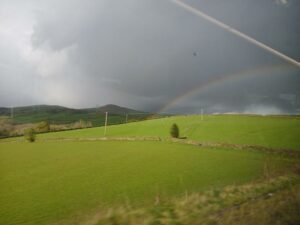Support us from £3/month
We deal with almost 1000 cases a year assisting communities, groups and individuals in protecting their local spaces and paths in all parts of England and Wales. Can you help us by joining as a member?
‘The new government must plan to provide better access for people, for their recreation and enjoyment, and for their health and well-being.’ This was the message from our general secretary Kate Ashbrook, speaking on 27 April at the 92nd anniversary event to commemorate the Kinder Scout Mass Trespass in 1932.

A rainbow welcomed Kate to the event on 27 April, at which she spoke of the need for the government to provide better access. Photo: Kate Ashbrook
The event, organised by the Hayfield Kinder Trespass Group, is to be held at Hayfield village hall in Derbyshire, at the foot of Kinder Scout.
‘This election year gives politicians the chance to tell us what they will do to improve public access,’ Kate continued. ‘There are great inequalities in people’s opportunity to get out and enjoy our countryside. It is vital to have green spaces and paths on people’s doorsteps.
‘The Open Spaces Society wants:
‘A new mandate requiring developers to register town or village greens as part of all developments above a certain size or density.
Developers often boast of providing “village greens” but unless they are registered as such they are not protected, and the public has no rights there: these are village greens in name only, a piece of developerspeak designed to deceive home-buyers. By registering such land, developers secure it in perpetuity for public enjoyment, close to people’s homes.
‘Local authorities to be encouraged voluntarily to dedicate their land as town or village green, to protect it from development and give local people rights there.
This will help greatly to achieve the government’s promise in its Environmental Improvement Plan of 31 January 2023 (on which we have so far seen no action) of providing, within five years, “blue or green space” within a 15-minute walk of people’s homes.
‘Funds in the Environmental Land Management Scheme (ELMS) to be used promptly to secure new and better access.
The money has already been identified, but there are questions about how it will be directed to places where access is needed, how it will be publicised, and who will monitor the spending of it.
‘Farmers and landowners receiving public money to be compelled to keep their paths and access land in good order, or have the funds withdrawn.
This should provide an incentive to landowners to obey the law and assist hard-pressed local authorities who have insufficient resources to carry out their duties of ensuring paths are in good order. Shockingly, a recent survey by the BBC showed that paths in England and Wales are blocked in 32,000 places, ie an obstruction every four and a half miles. Most people will not go where the path is blocked, so we are being denied our rights to thousands of miles of public paths.
‘The new government speedily to issue a consultation paper on how to improve access for all, based on the Outdoors For All manifesto, supported by 46 organisations.
By launching a consultation on access as soon as possible after the election, the new government will instil confidence that it understands the many benefits of public access to people’s health and to the economy, and the need to uphold and extend our rights in town and country.
‘Now we must work together to achieve these and the many other aims. We know that there is little public money, but we also know that paths, green spaces, and access are a rewarding investment in people’s health and well-being. It will be up to a new government to seize this chance,’ Kate declared.

Kingsmead Field, Canterbury, voluntarily registered by Canterbury City Council, Kent. Photo: Open Spaces Society
Outdoors for All (published in March) calls for a future government, among other things, to:
- extend public open-access rights to more landscapes, including waterways, woodland, riversides, and downland, with more and better-connected spaces close to where people live;
- embed public-access options in ELMS;
- repeal the cut-off date for registering historic rights of way;
- establish an Access to Nature Investment Strategy to target resources to maintain, enhance, and extend access opportunities;
- make the 15-minute to nature commitment a legally-binding target for government;
- strengthen the purposes and duties of national parks and national landscapes to enable them to deliver more on nature recovery, and climate mitigation and adaptation;
- promote the countryside code;
- ensure that children have the opportunity to spend regular and extended time in nature;
- ensure that spending on active and sustainable travel includes schemes giving access to the natural environment without having to use a car.
